
AMPHIBIA-REPTILIA
Scope & Guideline
Illuminating the World of Amphibians and Reptiles
Introduction
Aims and Scopes
- Ecology and Behavior:
Research on the ecological dynamics, behavior, and interactions of amphibians and reptiles within their habitats, including impacts of environmental changes and anthropogenic factors. - Conservation Biology:
Studies aimed at understanding the conservation needs of amphibians and reptiles, including population genetics, habitat requirements, and threats from invasive species. - Physiology and Morphology:
Investigations into the physiological adaptations and morphological variations among different species, emphasizing how these traits relate to their survival and reproduction. - Evolutionary Biology:
Exploration of evolutionary processes, phylogenetics, and biogeography that shape the diversity of amphibians and reptiles, including speciation events and hybridization. - Environmental Impact Studies:
Assessments of how environmental changes, including climate change and habitat loss, affect amphibian and reptile populations and their ecosystems.
Trending and Emerging
- Impact of Climate Change:
A growing number of studies are focusing on how climate change affects the behavior, distribution, and survival of amphibians and reptiles, reflecting an urgent need to understand these impacts. - Invasive Species and Hybridization:
Research on the ecological impacts of invasive species and hybridization phenomena is increasingly prominent, underscoring the challenges faced by native amphibian and reptile populations. - Genomic and Molecular Studies:
There is a notable trend toward utilizing genomic and molecular techniques to address questions of diversity, phylogeny, and population structure, providing deeper insights into evolutionary processes. - Citizen Science and Public Engagement:
Emerging studies are leveraging citizen science initiatives to gather data on amphibian and reptile populations, highlighting the importance of public participation in conservation efforts. - Disease Ecology:
Research addressing the ecology of diseases affecting amphibians and reptiles has gained importance, particularly in light of the global amphibian decline linked to pathogens.
Declining or Waning
- Traditional Taxonomy:
While taxonomy remains important, there is a noticeable decline in papers solely focused on taxonomic revisions in favor of studies addressing ecological and conservation aspects. - Morphological Studies without Ecological Context:
Research that examines morphological traits in isolation, without linking them to ecological or evolutionary implications, appears to be less frequent. - Local Species Surveys:
Although valuable, studies that merely document species presence in local areas are less common as the field shifts toward understanding broader ecological interactions and conservation needs. - Laboratory-Based Physiological Studies:
There seems to be a reduction in purely laboratory-based physiological studies, with a trend toward integrating field studies that assess physiological responses in natural environments.
Similar Journals

Journal of Vertebrate Biology
Unveiling the complexities of vertebrate life.Journal of Vertebrate Biology, a reputable publication established by the Institute of Vertebrate Biology in the Czech Republic, serves as a vital platform for research across the fields of Animal Science and Zoology, Aquatic Science, and Ecology, Evolution, Behavior and Systematics. With its ISSN 2694-7684 and a commendable 2023 Q2 ranking in multiple categories, this open-access journal embraces innovative scientific inquiry and fosters academic discourse. The journal's commitment to disseminating high-quality research is reflected in its Scopus rankings, positioning it within the top quartile in several impactful areas. As it continues to converge its focus until 2024, researchers, professionals, and students alike are encouraged to engage with cutting-edge studies that advance our understanding of vertebrate biology. This publication stands out not only in its scholarly contributions but also in enhancing global awareness of biodiversity and conservation issues.
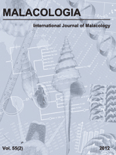
MALACOLOGIA
Championing Rigorous Research in Malacology and EcologyMALACOLOGIA, an esteemed journal published by the INST MALACOL, serves as a vital platform for advancing knowledge and research in the fields of malacology, ecology, and zoology. Established in the United States, this journal has been contributing to the scientific community since its inception, encompassing an array of converged years from 1971 through to 2022, with ongoing publications planned for 2024. With a Q3 category ranking in both Animal Science and Zoology as well as Ecology, Evolution, Behavior and Systematics in 2023, it holds significant relevance for researchers seeking to publish their work in a reputable outlet. Although Open Access options are currently not available, the journal maintains a robust academic standard and impact within its categories, as evidenced by its Scopus rankings. Researchers, professionals, and students alike will find this journal invaluable for its rigorously peer-reviewed content and commitment to enhancing our understanding of mollusks and related ecological interactions.
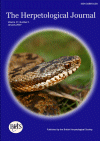
HERPETOLOGICAL JOURNAL
Championing the conservation of reptiles and amphibians worldwide.Herpetological Journal, published by the British Herpetological Society, is a prominent platform dedicated to publishing high-quality research in the fields of herpetology, ecology, and conservation. With its ISSN 0268-0130, this journal has established a significant presence in the academic community, especially as it continues its publication journey from 1987 to 2024. Notably, the journal boasts a commendable impact factor, being ranked in the second quartile (Q2) for Animal Science and Zoology, and holds a third quartile (Q3) ranking in other essential categories including Ecological Modeling and Ecology, Evolution, Behavior and Systematics. The Herpetological Journal serves as an indispensable resource for researchers, professionals, and students, fostering the exchange of innovative ideas and insights crucial to the understanding of reptiles and amphibians. Although the journal currently does not offer open access, it remains a vital choice for those invested in the ongoing dialogue around herpetological studies and nature conservation.

POPULATION ECOLOGY
Transforming ecological insights into actionable knowledge.Population Ecology is a leading journal dedicated to the advancement of research in the field of ecology, evolution, and behavior, published by the esteemed Wiley in Japan. With an impact factor indicative of its academic significance and ranked Q2 in the 2023 Ecology category, this journal serves as a pivotal resource for researchers, professionals, and students alike, facilitating the dissemination of high-quality research and innovative discussions. Covering diverse aspects of ecological dynamics, population processes, and their evolutionary implications, Population Ecology fosters a deeper understanding of species interactions and environmental factors shaping ecosystems. Available in both print and online formats (E-ISSN 1438-390X), the journal is committed to open access to enhance public engagement and accessibility to crucial scientific findings, ultimately contributing to informed decision-making regarding biodiversity and conservation efforts. With a robust ranking of #235 out of 721 in Agricultural and Biological Sciences, it is poised to remain at the forefront of ecological research through 2024 and beyond.

Redia-Journal of Zoology
Championing innovation in agricultural and biological sciences.Redia-Journal of Zoology, published by the CRA-Research Centre Agrobiology & Pedology in Italy, is a distinguished academic journal dedicated to advancing the field of zoological studies through high-quality research and insightful reviews. With an ISSN of 0370-4327, this journal provides a platform for scholars and practitioners in the Agricultural and Biological Sciences to disseminate their findings and engage in meaningful discourse. Recognized in the 2023 Scopus rankings as Q2 in its category, Redia occupies a notable position within the global research community, ranked 138 out of 221 in Agricultural and Biological Sciences. The journal has a commitment to publishing original research from 2011 until 2024, contributing to the body of knowledge in diverse sub-disciplines of zoology, ecology, and conservation. While currently not open access, Redia strives to foster collaboration and discussion among researchers, making it a vital resource for advancing zoological sciences.
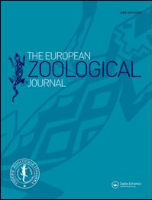
European Zoological Journal
Championing Open Access to Zoological KnowledgeEuropean Zoological Journal, published by Taylor & Francis Ltd, is an esteemed open-access publication dedicated to advancing the exciting field of zoology. Since its inception in 2017, this journal has progressively established itself as a vital resource for researchers, professionals, and students alike. With its Q2 ranking in Animal Science and Zoology as of 2023, the journal ranks in the 69th percentile among its peers, showcasing its influence and contribution to the discipline. The journal’s broad scope covers a wide range of topics within zoology, aiming to foster an understanding of animal biology and conservation efforts. As an open-access journal, it not only enhances the dissemination of knowledge but also encourages collaborative research across global communities. Situated in the United Kingdom, the European Zoological Journal invites submissions that contribute to the evolving discourse in animal sciences, and endeavors to support the scientific community in addressing pressing ecological challenges.
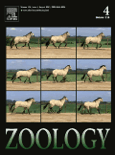
ZOOLOGY
Celebrating 30 years of excellence in zoological studies.ZOOLOGY, an esteemed journal published by Elsevier GmbH, stands at the forefront of research in the Animal Science and Zoology fields. With a notable impact factor and recognized as a Q1 category journal in its discipline, ZOOLOGY is highly regarded among researchers, ranking #98 out of 490 in Scopus rankings. Founded in 1994 and continuing through to 2024, the journal aims to publish cutting-edge, peer-reviewed articles that contribute significantly to the understanding of zoological sciences. Based in Munich, Germany, ZOOLOGY provides both subscription and open access options, ensuring that influential research reaches a wider audience. It serves as an essential platform for disseminating innovative findings, connecting scholars globally, and fostering interdisciplinary collaboration to advance zoological knowledge.
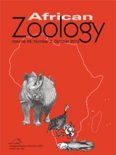
AFRICAN ZOOLOGY
Unveiling the Wonders of African WildlifeAFRICAN ZOOLOGY, published by Taylor & Francis Ltd, stands as a significant journal in the realm of Animal Science and Zoology, with a proud history dating back to 1996 and slated to continue until 2024. With an ISSN of 1562-7020 and E-ISSN 2224-073X, this journal provides a reputable platform for researchers and practitioners dedicated to the study of animal biology across the African continent. It has been recognized for its quality scholarship, evidenced by its Q3 categorization in the 2023 Scopus quartile rankings and an impressive rank of #182 out of 490 within its field. As an open-access journal, it facilitates the dissemination of vital research findings and promotes broader accessibility, catering to a diverse audience of professionals, scholars, and students alike. The journal aims to enhance our understanding of wildlife, conservation, and ecosystem dynamics in Africa, fostering collaborations that address critical ecological challenges. For researchers and enthusiasts keen on contributing to and staying informed about advancements in zoological science, AFRICAN ZOOLOGY is an essential resource that enriches the global discourse on biodiversity and conservation efforts.

BMC Zoology
Bridging gaps in zoology for a global audience.BMC Zoology, published by BMC, is a distinguished open-access journal that has been advancing the field of zoological research since its inception in 2016. With an impressive Q2 ranking in both Animal Science and Zoology categories as of 2023, the journal occupies a significant position in the academic landscape, engaging a global readership dedicated to the exploration of animal biology. Based in the United Kingdom, BMC Zoology prides itself on providing a platform for innovative research, fostering collaboration among scientists, and facilitating access to high-quality scholarly articles. Researchers and practitioners in zoology can benefit from its extensive repository of articles that span various areas including conservation, ecology, and evolutionary biology. As an essential resource for scholars and students alike, BMC Zoology commits to enhancing the dissemination of knowledge in the zoological sciences through its open-access model, ensuring widespread access to cutting-edge research findings.
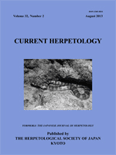
CURRENT HERPETOLOGY
Bridging global insights in herpetological research.CURRENT HERPETOLOGY is a leading journal dedicated to the study of reptiles and amphibians, published by the Herpetological Society of Japan in collaboration with the Graduate School of Science at Kyoto University. With its ISSN 1345-5834 and E-ISSN 1881-1019, this journal serves as a vital platform for sharing significant research findings in the field of herpetology. The journal has been continuously contributing to the scientific community since its inception in 2000, with a scope that embraces diverse topics including ecology, behavior, conservation, and physiology of herpetofauna. Recognized for its scholarly impact, CURRENT HERPETOLOGY holds a commendable position within the Q3 quartile in the Animal Science and Zoology category, ranking 350 out of 490 according to Scopus metrics. Although it is not currently an open-access journal, it caters to an audience comprising researchers, professionals, and students looking to deepen their understanding and engage with cutting-edge studies. Based in Japan, at the Department of Zoology in Kyoto, this journal is poised to foster advancements in herpetological research and promote global collaboration in this vital area of science.